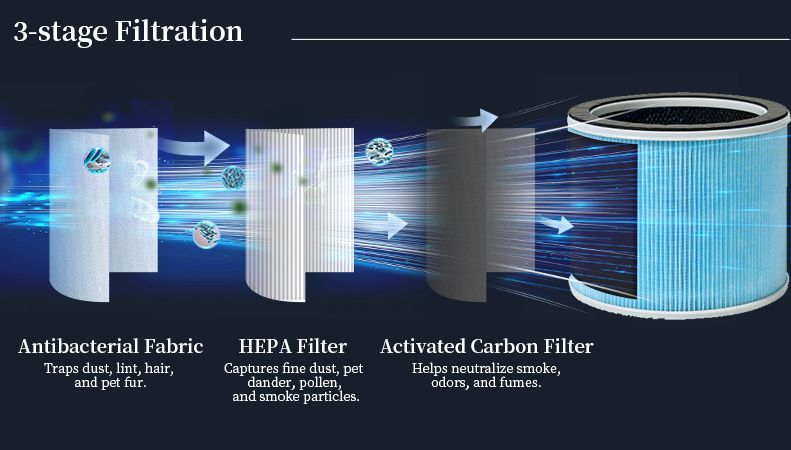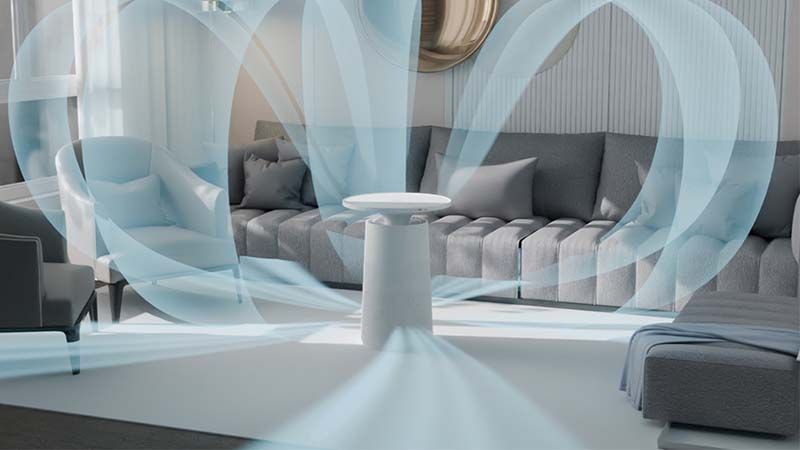
Get A Quote
How Many Air Purifiers Do I Need
Air purifiers have become an essential appliance in every family which remove hair, pollen, bacteria, odors, etc. In theory, every room should be equipped with an air purifier for comprehensively purifying the air, however in reality, we also should consider room size, purification needs and budget.
Things You Should Know
The purification effect depends on the structure of the filter, which is usually composed of primary filter, hepa filter and activated carbon.
- The primary filter mainly filters large particles, such as animal hair, hair, dander, etc.
- Hepa filter can filter tiny particles such as dust, pollen, bacteria, and viruses, it is divided into H11, H12, H13, and H14. The H14 filter has the 99.995% filtration efficiency.
- The activated carbon filter can filter gaseous pollutants such as formaldehyde, toluene, hydrogen sulfide, and second-hand smoke.
How Many Air Purifiers Should You Have in Your Home
Room Quantity and Size
Firstly ,you should decide which rooms need air purifier, and then use a tape measure to measure the length and width to calculate the square feet of the room.
Based on the AHAM (Association of Home Appliance Manufacturers) air filtration standards, the CADR of an air purifier should be equal to at least two-thirds of the room's square footage (based on an 8-foot ceiling height), and if you have a room with high ceilings, you'll need an air purifier with a higher CADR,or two and more air purifiers.
Air Quality Needs
Determine the number and needs of your family members, their sensitivity to irritants and odors, and whether air purifiers need to be placed in the living room and bedrooms.
- Pet Family
Pet hair and odors that can be seen everywhere are problems that every pet family will inevitably face. You need to place the air purifier in a safe area where pets often stay. You can also place air purifiers in more than one room to capture the hair and bacteria, peculiar, smell, etc.
- People with Allergies or Asthma
These people are particularly sensitive to pollen and dust in the air and have relatively high requirements for air quality. You need to choose an air purifier with higher CADR rate or more than one to purify larger area .
- Families with Children or Pregnant Women
Pregnant women and children have sensitive respiratory systems and relatively low immunity, making them vulnerable to harmful substances such as viruses and bacteria. You can choose multiple air purifiers and place them in areas where you often stay.
Budget
When choosing the number of air purifiers, you need to consider these three aspects of your budget.
- Product Price
Air purifier prices vary depending on brand, function, and technology. When purchasing, you need to choose one or more models based on comprehensive factors such as price, purification area, CADR value, filtration effect, noise level, brand, and after-sales service.
- Electricity Cost
Air purifiers need to run for a long time, which also involves expenses. You need to make a comprehensive calculation based on power, usage time, electricity price, etc. Electricity fee = power in watts × hours ÷ 1000 × kWh rate
- Replacement of Filter Element
In order to ensure the purification effect, the filter element of an air purifier usually needs to be replaced every 3-6 months. Each brand of filter element has different materials, sizes, and prices. You need to find out the frequency and cost of replacement.
Where to Place Air Purifier
The Room Where You Spend Most of Time.
It should be placed in rooms where family activities are concentrated, such as the living room and bedroom, to ensure that people in these areas can breathe fresher air.
Near the Indoor Air Pollution
Try to place it in a room with a high concentration of harmful gases to quickly reduce the concentration of harmful gases.
Away From Obstacles
Stay away from sofas, tables, shelves, walls and other obstacles to ensure better air circulation at the air inlets and outlets, which helps indoor air circulation.


